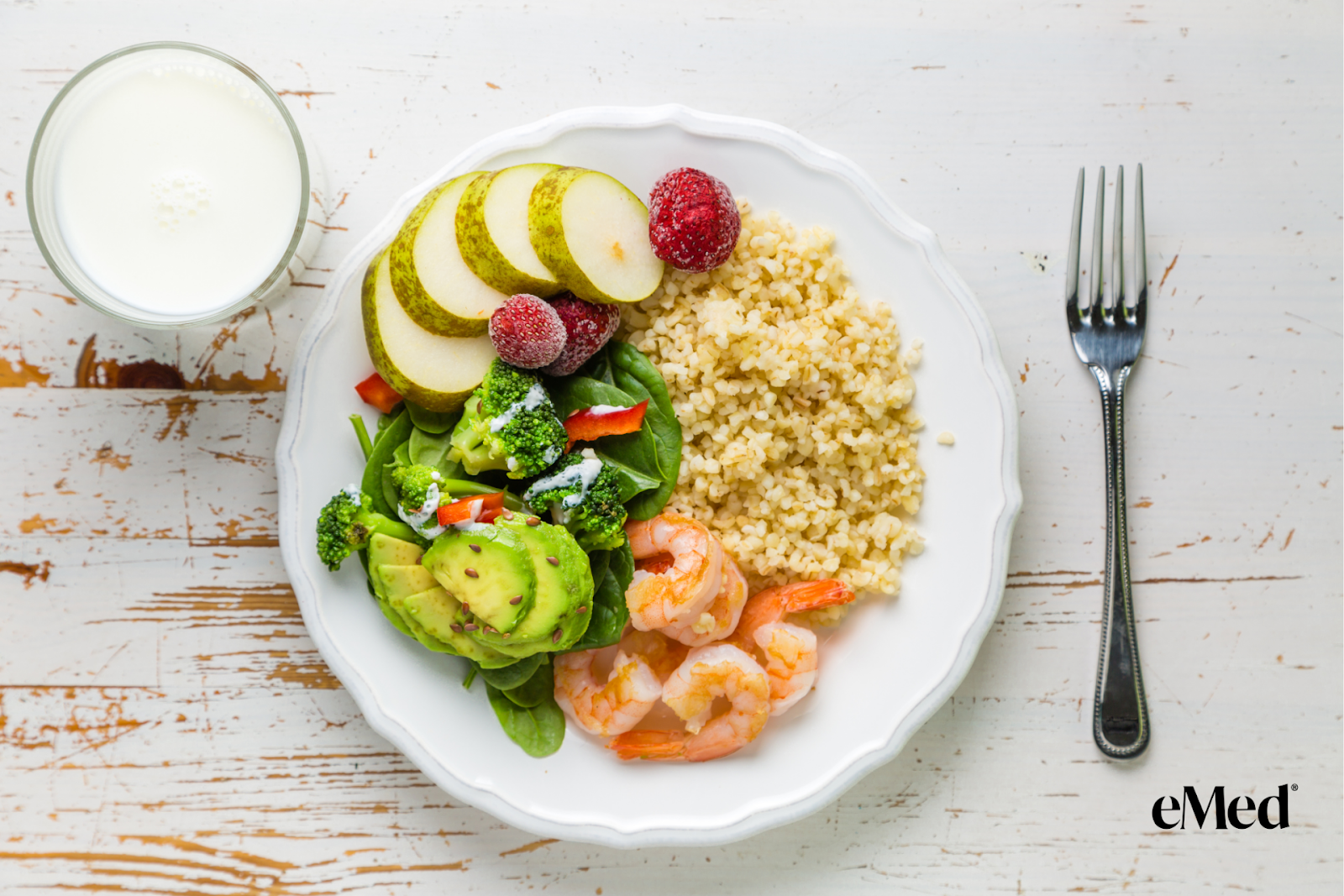Weight loss can often feel like a challenge, especially in the UK, where busy lifestyles and the prevalence of unhealthy food environments make it challenging to maintain a healthy diet. Many individuals find themselves juggling work, family commitments, and social activities, which can lead to poor food choices and limited time for meal preparation. The temptation of convenient, high-calorie options is ever-present, making the journey toward weight loss seem daunting and overwhelming.
This blog post aims to provide a science-backed guide to weight loss. By exploring various dietary approaches and their effectiveness, we hope to empower individuals to make informed choices that align with their personal lifestyles and preferences. Whether you are on GLP-1 medication or just searching popular diets like the Mediterranean or 5:2, or seeking sustainable habits for long-term health, our goal is to support you in finding the best path to achieving your weight loss goals while prioritising your overall well-being.
Popular Diets for Weight Loss
There is no one-size-fits-all solution when it comes to weight loss diets, as their effectiveness can vary greatly depending on individual factors. Each person's body is unique, meaning that a diet that works well for one individual may not be suitable for another. Below is a table comparing some popular and effective diets for weight loss, highlighting their key features and potential benefits.
| Diet | Key Principles | Potential Benefits | Considerations |
| Mediterranean | Emphasises fruits, vegetables, whole grains, lean proteins, and healthy fats | Heart-healthy, may reduce inflammation, sustainable long-term | May not lead to rapid weight loss |
| Low-Carb | Restricts carbohydrates, focuses on proteins and fats | Can lead to quick initial weight loss, may improve blood sugar control | May be difficult to sustain, potential nutrient deficiencies |
| DASH | Emphasises fruits, vegetables, whole grains, lean proteins; limits sodium | Helps lower blood pressure, nutrient-rich | May require significant dietary changes |
| Flexitarian | Mostly plant-based with occasional meat consumption | Environmentally friendly, flexible approach | May require meal planning to ensure adequate protein intake |
| WW (Weight Watchers) | Points-based system, no foods off-limits | Flexible, teaches portion control | Requires tracking points, may be costly |
| Intermittent Fasting | Alternates periods of eating and fasting | May improve insulin sensitivity, flexible eating windows | Can be challenging to adapt to, may lead to overeating during eating periods |
| Volumetrics | Focuses on low-calorie, high-volume foods | Allows large portions of certain foods, nutrient-dense | Requires understanding of food energy density |
| Plant-Based | Eliminates or minimises animal products | May lower risk of chronic diseases, environmentally friendly | Requires careful planning to meet nutritional needs |
The Psychology of Weight Loss

Embarking on a weight loss journey requires not only dietary changes but also a compassionate approach to mindset, goal-setting, and stress management. By fostering a positive internal dialogue, setting realistic goals, and effectively managing stress, individuals can navigate the complexities of weight loss with greater ease.
The Importance of Mindset
A positive mindset plays a crucial role in the weight loss journey. Research indicates that self-compassion and positive self-talk can significantly influence one’s ability to lose weight and maintain healthy habits. For instance, a study found that individuals who practise self-compassion are less likely to engage in emotional eating and more likely to adopt healthier behaviours. This highlights the power of our inner dialogue; replacing negative thoughts like “I’ll never lose this weight” with affirmations such as “I am capable of making healthy choices” can foster a more supportive mental environment for change.
Setting Realistic Goals
Setting achievable and sustainable goals is essential to avoid frustration and setbacks. Research suggests that individuals who set specific and attainable goals are more likely to succeed in their weight loss efforts. A systematic review indicated that goal-setting can significantly enhance motivation and behaviour change, particularly when goals are challenging yet realistic. For example, instead of aiming to lose a large amount of weight in a short time, consider setting a goal to lose 1-2 pounds per week. This gradual approach not only makes the process more manageable but also helps to establish lasting habits.
Stress Management
Stress is a significant factor that can contribute to weight gain and hinder weight loss efforts. The relationship between stress and eating behaviours is well-documented; many individuals turn to food for comfort during stressful times, leading to overeating. A study found that chronic stress is associated with increased appetite and cravings for high-calorie foods. To combat this, incorporating stress-reduction techniques can be beneficial. Practices such as mindfulness meditation, regular physical activity, and deep-breathing exercises can help manage stress levels and promote healthier eating patterns.
The Role of Nutrition in Weight Loss

In the UK, common dietary challenges include the prevalence of high-calorie takeaways and processed foods. To overcome these obstacles, focus on preparing meals at home using fresh, whole ingredients. When dining out, research healthier options and be mindful of portion sizes. Research found that home-cooked meals are associated with better diet quality and lower risk of obesity.
The Importance of a Balanced Diet
A balanced diet is the foundation of a healthy lifestyle and an effective weight loss plan. It should consist of a variety of nutrient-dense foods, including:
- Fruits and vegetables: Rich in fibre, vitamins, and minerals, fruits and vegetables help you feel full while providing essential nutrients. A study published in the Journal of the American College of Nutrition found that increasing fruit and vegetable intake can lead to significant weight loss and reduced risk of chronic diseases.
- Whole grains: Whole grains, such as brown rice, quinoa, and whole wheat bread, are high in fibre and can help regulate blood sugar levels. A systematic review suggests that whole grain consumption is associated with lower body weight and reduced risk of obesity.
- Lean proteins: Lean proteins, like chicken, fish, and legumes, help build and maintain muscle mass while promoting feelings of fullness. A study demonstrated that a high-protein diet can enhance weight loss and improve body composition.
- Healthy fats: Unsaturated fats found in foods like avocados, nuts, and olive oil are essential for overall health and can help you feel satisfied. A randomised controlled trial showed that a Mediterranean diet rich in healthy fats can lead to significant weight loss and reduced risk of cardiovascular disease.
Portion Control and Mindful Eating

Portion control is crucial for weight management, as it helps you maintain a calorie deficit without feeling deprived. Strategies for mindful eating include using smaller plates, eating slowly, and being aware of hunger and fullness cues. A study found that portion control education can lead to significant reductions in calorie intake and body weight.
The Importance of Hydration
Staying hydrated is essential for weight loss and overall health. Water aids in digestion, helps regulate body temperature, and can even boost metabolism. A study suggests that drinking water can increase energy expenditure and promote weight loss.
The Importance of Physical Activity
In the UK, where sedentary lifestyles and a lack of physical activity have become increasingly prevalent, it is crucial to emphasise the importance of regular exercise. While the barriers to an active lifestyle can seem daunting, especially for those who have not been physically active in a long time, the benefits of incorporating exercise into one's daily routine are numerous and far-reaching.
Finding Joy in Movement
One of the keys to maintaining a physically active lifestyle is finding activities that you genuinely enjoy. Whether it's brisk walking, dancing, swimming, cycling or even gardening, engaging in physical activities that bring you pleasure makes it more likely that you will stick with them in the long run. Studies have found that individuals who participated in activities they found enjoyable were more likely to maintain their exercise routines over time.
Remember, any amount of physical activity is better than none, and the more you do, the greater the rewards will be.
Addressing Common Weight Loss Myths
In the journey of weight loss, you might encounter a myriad of myths and misconceptions that can hinder your progress. From the allure of quick-fix diets to the belief that genetics solely determines body weight, these myths can lead to frustration and unhealthy behaviours. Understanding the truth behind these misconceptions is essential for achieving sustainable weight loss.
Debunking Fad Diets

Fad diets, characterised by their promise of rapid weight loss through extreme caloric restriction or the elimination of entire food groups, are often unsustainable and potentially harmful. While they may yield short-term results, they frequently lead to nutrient deficiencies and the infamous yo-yo effect, where individuals regain the weight they lost and often more. A systematic review highlights that many fad diets lack scientific backing and can result in adverse health effects, including metabolic disturbances and psychological stress due to restrictive eating patterns .
For example, the ketogenic diet, which severely restricts carbohydrates, may lead to initial weight loss but is often difficult to maintain long-term. Studies have found that adherence to such diets is typically low, with many individuals abandoning them after a few months due to the restrictive nature and associated side effects, such as fatigue and nutrient deficiencies.
The Importance of Consistency
Achieving long-term weight loss requires gradual, sustainable changes rather than drastic measures. Research indicates that individuals who adopt consistent, moderate changes to their diet and exercise routines are more successful in maintaining weight loss over time. A study published in the American Journal of Clinical Nutrition found that participants who focused on making small, manageable changes, such as reducing portion sizes and increasing physical activity, were more likely to achieve and maintain their weight loss goals compared to those who attempted extreme diets.
Setting realistic goals is crucial. For instance, aiming to lose 1-2 pounds (approximately 0.5-1 kg) per week is a sustainable target that encourages healthy habits without the pressure of rapid results. This approach not only fosters a positive relationship with food but also helps individuals develop lifelong healthy eating patterns.
The Role of Genetics
While genetics can influence body weight and fat distribution, it is essential to recognise that lifestyle factors play a significant role in weight management. Research demonstrates that while genetic predispositions can affect weight, environmental factors, such as diet and physical activity, are critical determinants of obesity.
This means that individuals can take control of their weight through lifestyle modifications, regardless of their genetic background. For example, a person with a genetic predisposition to obesity can still achieve a healthy weight by adopting a balanced diet and engaging in regular physical activity. Emphasising a holistic approach that includes nutrition, exercise, and mental well-being is vital for effective weight management.
Conclusion
Weight loss is a personal journey that requires a balanced approach combining healthy eating, regular exercise, and a positive mindset. While sustainable weight loss takes time, if you're looking for quicker results with professional support, consider eMed Healthcare's Weight Loss Programme.
Their doctor-led solution offers:
- Clinically-proven weight loss medication
- Weekly health check-ins
- Personalised diet and exercise advice
- Mental health support
To get started on your weight loss journey with expert guidance, visit eMed's website or call their clinic to book a consultation today.
Frequently asked questions:
What is the best diet for weight loss in the UK?
The Mediterranean diet and intermittent fasting diets like the 5:2 diet are considered among the best for weight loss in the UK. They emphasise whole, unprocessed foods and portion control without being overly restrictive.
However, contacting a nutritionist or healthcare professional is advised to personalise your diet according to your needs.
Is the keto diet effective for weight loss?
Keto diets can be effective for short-term weight loss by putting the body into ketosis. However, make sure to not make the diet very restrictive. Otherwise it can be difficult to maintain long-term, and may not provide balanced nutrition.
How much weight can I expect to lose per week?
Health guidelines recommend aiming for a gradual weight loss of 0.5-1 kg (1-2 lbs) per week. This rate is more sustainable and less likely to lead to regain compared to rapid weight loss.
Do I need to count calories to lose weight?
Calorie control is an important part of weight loss, but the best approach is finding a plan you can stick to long-term. Portion control, eating a balanced diet, and regular physical activity are key.
What are some healthy eating tips for weight loss?
- Eat plenty of fruits, vegetables, whole grains, lean proteins and healthy fats
- Limit processed foods, sugary drinks, and foods high in saturated fat
- Stay hydrated by drinking water
- Be mindful of portion sizes
- Cook meals at home using healthy ingredients
- Find physical activities you enjoy and aim for 150+ minutes per week
How can I make my weight loss plan sustainable?
- Set realistic, achievable goals
- Focus on developing healthy habits rather than quick fixes
- Find an eating plan that fits your lifestyle and food preferences
- Enlist support from friends, family or a weight loss group
- Celebrate non-scale victories like increased energy and better sleep
- Be patient with yourself and don't get discouraged by setbacks
References
- Assessing physical access to healthy food across the United Kingdom: A systematic review of measures and findings. PMC. Retrieved from https://www.ncbi.nlm.nih.gov/pmc/articles/PMC4663587/.
- Effects of an Intermittent Fasting 5:2 Plus Program on Body Weight in Chinese Adults with Overweight or Obesity: A Pilot Study. PMC. Retrieved from https://pubmed.ncbi.nlm.nih.gov/23070875/.
- Building a practically useful theory of goal setting and task motivation: A 35-year odyssey. PubMed. Retrieved from https://pubmed.ncbi.nlm.nih.gov/12002982/.
- Relationship between stress, eating behaviour, and obesity. PubMed. Retrieved from https://pubmed.ncbi.nlm.nih.gov/17588218/.
- Frequency of eating home cooked meals and potential benefits for diet and health: cross-sectional analysis of a population-based cohort study. PubMed. Retrieved from https://pubmed.ncbi.nlm.nih.gov/22649266/.
- Relationship of fruit and vegetable intake with adiposity: a systematic review. PubMed. Retrieved from https://pubmed.ncbi.nlm.nih.gov/22649266/.
- Clinical Evidence and Mechanisms of High-Protein Diet-Induced Weight Loss. PMC. Retrieved from https://www.ncbi.nlm.nih.gov/pmc/articles/PMC6118631/.
- Effect of a high-fat Mediterranean diet on bodyweight and waist circumference: a prespecified secondary outcomes analysis of the PREDIMED randomised controlled trial. PubMed. Retrieved from https://pubmed.ncbi.nlm.nih.gov/28445475/.
- What is the role of portion control in weight management? PMC. Retrieved from https://www.ncbi.nlm.nih.gov/pmc/articles/PMC6118631/.
- Health Promotion and Hydration: A Systematic Review About Hydration Care. PMC. Retrieved from https://www.ncbi.nlm.nih.gov/pmc/articles/PMC9623173/.
- Physical Activity and Sedentary Behavior: A Population-Based Study of Barriers, Enjoyment, and Preference. ResearchGate. Retrieved from https://www.researchgate.net/publication/335789123_Physical_Activity_and_Sedentary_Behavior_A_Population-Based_Study_of_Barriers_Enjoyment_and_Preference.
- Health Benefits of Cycling: A Systematic Review. PMC. Retrieved from https://www.ncbi.nlm.nih.gov/pmc/articles/PMC7752999/.
- Does Physical Activity Increase Life Expectancy? A Review of the Literature. PMC. Retrieved from https://pubmed.ncbi.nlm.nih.gov/35866077/.
- Dietary Management of Obesity: A Review of the Evidence. PMC. Retrieved from https://www.ncbi.nlm.nih.gov/pmc/articles/PMC9623173/.
- Effect of Dietary Adherence on the Body Weight Plateau: A Mathematical Model Incorporating Intermittent Compliance with Energy Intake Prescription. PubMed. Retrieved from https://pubmed.ncbi.nlm.nih.gov/22649266/.
- Lifestyle Modification Approaches for the Treatment of Obesity in Adults. PMC. Retrieved from https://www.ncbi.nlm.nih.gov/pmc/articles/PMC9623173/.
- The Genetics of Obesity: From Discovery to Biology. PMC. Retrieved from https://www.ncbi.nlm.nih.gov/pmc/articles/PMC9623173/.
- Emed Health. (n.d.). Weight Management. Available at: https://www.emed.com/uk/weight-management

